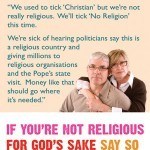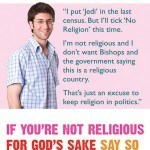Shortly after the General Election Tim Farron resigned as leader of the Liberal Democrats. He said that it was impossible to maintain his Christian faith and be party leader. He was echoing a complaint from many practising Christians that they feel excluded from the party and in wider liberal circles. Muslims feel exclusion too, though often from different people. Is this true? And if it is, does it matter?
Opposition to discrimination is one of the defining principles of liberals. This started with religion, and in particular, in England, discrimination against Catholics and various non-conformist sects, such as the Quakers. It then moved on to issues of sex, race and sexual orientation. Now the problem seems to be between secularists and those practising religions with a universal claim to truth, such as Christianity and Islam.
At the heart of this is a genuine problem. Many adherents of these faiths claim that their faith requires discrimination against sex and sexual orientation, and opposition to such modern practices as abortion. These are important battlegrounds for liberals. Christians who believe that the state should discriminate in these fields clearly can’t be liberals. But how far should liberals lay claim to private beliefs? It is quite common for people to say that they don’t believe in abortion personally, but that they do believe that the state should permit it – that it should be a matter of personal conscience.
It is over such issues that Tim Farron tripped up. He was seen to prevaricate. Famously he tried to evade a question about whether gay sex was a sin, with the statement that “we are all sinners”. I have some sympathy with him over that one. I have a church upbringing, and though I am no theologian, I know enough to tell that what Christians mean by sin is quite a complicated thing. The point is not to avoid being a sinner, but to forgive sins. I could add that many Christians feel that hetorosexual sex is a sin – or at least taking pleasure in it is – although this has softened in recent times. Tim was trying to say that it was the wrong question. Much later he clarified to say that he didn’t think gay sex was a sin, but the damage had been done. To many “sin” meant “wrong” and that he therefore could not be trusted to uphold liberal values. The party’s opponents made useful weather of this (unofficially, of course). It did real harm to the party.
That makes me very uncomfortable. It seems to exclude a large number of religious people from the movement. It draws the line in the wrong place. Liberalism is becoming equated with aggressive secularism. The response of many people (such as the Guardian’s Polly Toynbee) is evasion. Religion was not the reason that Tim resigned, they say, but political ineptitude. Well there are plenty of reasons for saying that Tim was not up to the job (including his evasive response to that interview question – and his rambling email when he resigned), but this type of reaction reminds me a lot of the ways that people try to escape accusations of race or sex discrimination by pointing to other reasons for their views. It’s the “I’m not racist but…” position.
Tim is hardly the first person to claim that liberals discriminated against him for his religious faith. It strikes me that secularists have no idea when they are being discriminatory. Again there are parallels with race and sex discrimination. Workplaces that accept women as equal provided they behave in exactly the same boorish way as the men are discriminating against women. I found advancing sex equality when I was working in the City of Londonwas really hard work in many roles, especially senior ones, as many men had no idea what the problem was. They did not see that a whole range of behaviours and assumptions were discriminatory. The Lib Dems themselves are wrestling with why so few women advance to elected office, and why so few people from ethnic minorities join it. I think there is a similar problem with religious faith amongst liberals, but it is worse because it is unacknowledged.
This is exacerbated by a certain intellectual arrogance amongst aggressive atheists, who form an important minority amongst liberals – people like Richard Dawkins who are apt to talk of prayer as “talking to your imaginary friend”. This stems from a rather old-fashioned logical-positivist outlook. They say that you should only believe things if there is sufficient evidence for them. But you have to have a nul hypothesis – you have to have a working assumption that you hold to until something with more evidence comes up. The battles of religion can be seen as asking what shape that nul hypothesis should take, and how much it should be based on handed down wisdom and shared understandings. To more thoughtful religious people, the classic aggressive-atheist viewpoint is an incomplete, like trying to drive a car through the rear-view mirror, and it is often device to evade discussion of important spiritual and moral issues. The point here is not to have debate on the virtues of religion, but suggest that many atheists suffer from arrogance and could do with a bit more intellectual humility.
Which would a good place to start when working out how to treat religious people in politics. So I want to make a number of points:
- Political movements should be about changing public life, and not private beliefs. There is much that liberals want to change, and to protect, in public life. It hurts that political cause if you exclude potential allies because of differences in private faith. This is happening with people of religious faith, and liberals need to be more tolerant.
- Being a liberal may still be quite challenging for many in particular religious traditions, especially those that set store by traditional teaching and interpretations of texts. Liberals need to give such people more space – without compromising on liberal public values. I don’t think they did with Tim Farron, or others like the former Lib Dem MP Sarah Teather.
- Liberals also need to be careful about promoting their own religious interpretations in the political sphere. This is a particular issue for Christianity. People like me who were brought up in the faith have strong views about some religious traditions. Pushing these views should not be part of political discourse – though, of course, that doesn’t mean that those views should not be aired. I might think that there is no serious theological objection to women priests – but I need to be careful about where and how I air that view, especially since I am no longer a practising Christian.
It strikes me that there are two things going on here. The first is that we should be more conscious of our religious or anti-religious biases, which could lead to discrimination in public life The second is that is important to bring people into the liberal political movement even where their religious faith creates tension.
So we should be worried that Tim Farron’s religious faith proved such an obstacle to being part of the liberal movement. And we shouldn’t pretend that it wasn’t.



